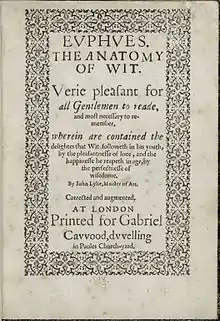Euphues
Euphues: The Anatomy of Wit /ˈjuːfjuːiːz/, a didactic romance written by John Lyly, was entered in the Stationers' Register 2 December 1578 and published that same year. It was followed by Euphues and his England, registered on 25 July 1579, but not published until Spring of 1580. The name Euphues is derived from Greek ευφυής (euphuēs) meaning "graceful, witty." Lyly adopted the name from Roger Ascham's The Scholemaster, which describes Euphues as a type of student who is "apte by goodnes of witte, and appliable by readines of will, to learning, hauving all other qualities of the mind and partes of the bodie, that must an other day serue learning, not trobled, mangled, and halfed, but sounde, whole, full & hable to do their office" (194). Lyly's mannered style is characterized by parallel arrangements and periphrases.[1]
 Title page of Euphues, c. 1578. | |
| Author | John Lyly |
|---|---|
| Country | England |
| Language | Early Modern English |
| Genre | Romance |
Publication date | 2 December 1578 |
| 823.2 | |
| LC Class | PR2302 .E8 |
The style of these novels gave rise to the term euphuism. The proverb "All is fair in love and war" has been attributed to Lyly's Euphues.[2][3]
Thomas Carlyle made reference to the character in his essay of social criticism, "Signs of the Times" (1829).[4]
Notes
- Fowler, Alastair. The History of English Literature, Harvard University Press, Cambridge, MA (1989) pp. 45–46 ISBN 0-674-39664-2
- Manser, M, and George Latimer Apperson. Wordsworth Dictionary of Proverbs. p. 355. 2006.
- Richard Alan Krieger. Civilization's Quotations: Life's Ideal. p. 49. 2002.
- ""Euphuists" — an annotation to Thomas Carlyle's "Signs of the Times"". victorianweb.org. Retrieved 2022-06-25.